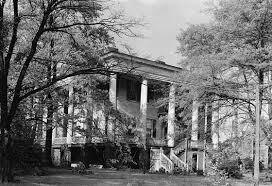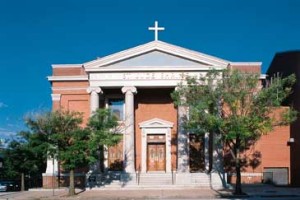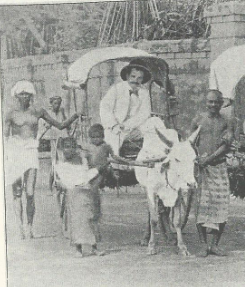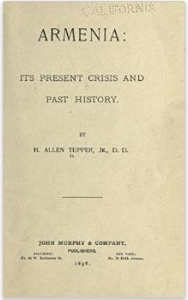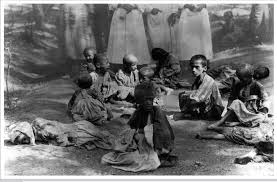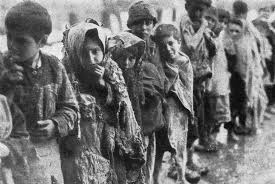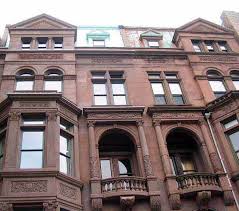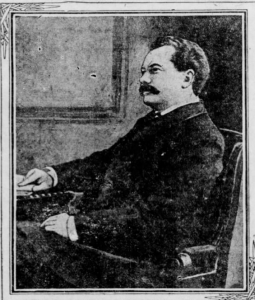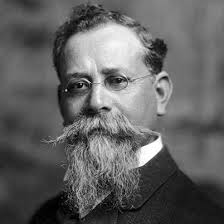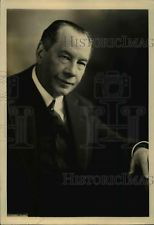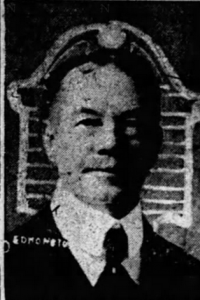Henry Allen Tupper, Jr. (1856-1927), was my wife’s first cousin, three times removed. He married Marie Louise Pender (1859-1921) on August 5, 1879, and they had three surviving children, Allene Pender (1859-1921), Katherine Boyce (1882-1979), and Tristram (1886-1954).
Henry was born in Washington, Georgia, where his father was a Baptist minister, and he followed in his father’s footsteps.
Henry Allen Tupper, Jr.’s birthplace
Henry was educated at Charleston College, the University of Virginia, and the Southern Baptist Theological Seminary, which his uncle, James Boyce, had founded.
Henry was the pastor of Seventh Baptist in Baltimore; its building, at Paca St. and Saratoga St., is now St. Jude’s Shrine.
The former Seventh Baptist, Baltimore, Maryland
He took a journey around the world in 1895-1896 and wrote a travelogue: Around the World with Eyes Wide Open; The W0nders of the World Pictured by the Pen and Pencil (1898).
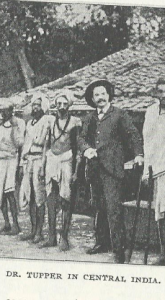 Henry in India (here he much resembles his uncle James Boyce)
Henry in India (here he much resembles his uncle James Boyce)
The Armenians
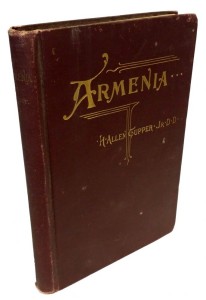
The most serious part of Henry’s travelogue is on Armenia, and he expanded it on a separate book on Armenia: Armenia: Its Present Crisis and Past History. He said of one Turkish atrocity against the Armenians, which included herding Armenians into a church, dousing them with gasoline, and setting them on fire:
Had it not been for the intervention of the authorities, after the set time of one, two, or three days, the entire Christian population would have been exterminated. And the bloody work was stopped, not because the Moslems did not want to make a clean sweep of the Christians and pillage all their goods, but because those who inspired the slaughter thought that one, two or three days of killing was about as much as Europe would stand at one time. Turkish Toleration. Nor let it be supposed that the Turks as such, hate the Armenians as such. The Armenians have been for centuries the most submissive and profitable subjects; and they would still be most loyal, if, instead of the increasingly oppressive policy of the Sultan Abdul Hamid, their lives and honor and property had been even tolerably protected. All this, many Turks know very well, and regret the cruel and utterly impolitic course of the present sovereign. The Turk, as a man, has many excellent qualities. It is his religion which at certain times makes a devil of him. It is the very essence of Mohammedanism that the Giaour has no right to live save in subjection.
Henry, a Baptist, praised the Armenians for their loyalty to Christianity:
For more than a thousand years, the Armenians have been subjected to the bitterest persecutions, and during these centuries they have willingly chosen death with terrible torture, rather than prove false to their faith.
Henry despaired because the apathy of the European Powers would offer no help to the Armenians. He proposed allowing the entire Armenian nation to emigrate to Canada and the United States. But nothing was done. The Turks noted that the Armenians had no friends, and began to murder them systematically, killing between 1 and 1 1/2 million, driving them into the deserts to die of thirst and starvation.
Still no one cared. Adolph Hitler, deciding what do do with the Slavs and Jews who occupied the lands that he wanted, asked Wer redet heute noch von der Vernichtung der Armenier? Who today speaks of the annihilation of the Armenians?
New Jersey and New York
He became the minister at First Baptist (1897-1900) in Montclair, New Jersey, apparently a well-to-do church.
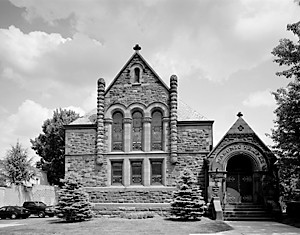 First Baptist, Montclair, New Jersey
First Baptist, Montclair, New Jersey
But he gave that up in to take the pastorate of Fifteenth St. Baptist church in Brooklyn, a poor church.
34 Gramercy Park
Henry seems to have some independent means, since he lived at 34 Gramercy Square in Manhattan; and in in he announced he would no longer take a salary from his church.
Mexico
Henry’s father had been corresponding secretary of missions for the Southern Baptists,and had helped found Baptist schools in Saltillo, Mexico. Henry’s sister Mary Caldwell taught there.
Henry Allen Tupper, 1913
After the presidency of Porfirio Diaz, Mexico suffered from a civil war between the Federalists and Constitutionalists. Protestants had established the International Peace Forum with Taft as its honorary president. They asked Henry to go to Mexico to investigate and to try to mediate between the factions. Presumably he was asked because of the family connection with the Mexican missions.
Venustiano Carranza (1859- assassinated 1920)
He went there and met Venustiano Carranza, with whom he was impressed, and thought him “an educated, cultivated man.” Henry was frequently in personal danger; his train was attacked, and with his daughter Allene he had to take refuge from a firefight in a theater in Mexico City. She had lived in Mexico City for eleven month as a correspondent. One day she and her father walked downtown to a movie. She said that
[we] had been watching the pictures about 15 minutes when hundreds of persons rushed in seeking refuge. When the place was filled the great iron shutters, which completely lock up the doors and windows of all the stores of Mexico City, were thrown into place. There we were herded like cattle, with the sound of bullets singing outside for several hours, when everything was declared safe, teh doors thrown open and we went out into teh street. The picked our way over the bodies of several citizens and horses and made our way home. The town hadn’t been attacked at all. It seemed that one group of soldiers merely wanted the horses that another group was riding.
Carranza buttered Henry up and expressed great interest in education in Mexico and a desire to establish complete religious liberty n Mexico. Carranza insisted on paying Henry’s travel expenses; Henry asked the opinion of Carranza’s attorney, who said Henry could accept the offer of $3,466 as reimbursement.
Carranza asked for an end to the embargo on American arms. Meanwhile Pancho Villa was raiding across the border and whole Mexican armies and their families were seeking refuge in Texas.
Henry’s father had been corresponding secretary of missions for the Southern Baptists,and had helped found Baptist schools in Saltillo, Mexico. Henry’s sister Mary Caldwell taught there, which the plight of the school a special pathos.
horses were stalled in the very room where my sister taught these girls, and I felt rather a personal interest in it, as my father had dedicated it.
Henry’s attempts to help got him into trouble; he had to explain his actions to the hostile Senate Committee on Foreign Affairs.
Cardinal Gibbons had written Henry to thank him for his work in Mexico, but the Jesuits in America claimed that the Constitutionalists were tools of the Protestants and had paid a bribe to Henry – who fortunately had kept records of all correspondence and deposits.
Henry lamented,
there are some people in the world who never get their eyes above dirt. It is money, money, money all the time.
As Senator Albert Fall pointed out to Henry, the 1917 Mexican constitution had forbidden any foreign-born clergy from working in Mexico and had forbidden any religious organization to operate any type of educational institution. Henry had been deceived; he should have listened to what he himself had said:
the more and more I studied Mexico…the more mysterious Mexico became. After I first paid my visit there I lectured on Mexico. The second time a paid a visit there I stopped lecturing on Mexico because I saw many angles to the situation.
Washington, D.C.
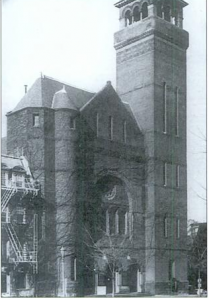 The old First Baptist, 16th St., Washington, D.C.
The old First Baptist, 16th St., Washington, D.C.
In 1918 Henry went to First Baptist on Sixteenth St. In Washington, D. C. (where Jimmy Carter would later attend church and teach Sunday school).
The mature Henry Allen Tupper
Davis, Harding’s Secretary of Labor, sent Henry to the Middle East in 1922 to look into immigration questions. Henry took the Orient Express from Paris to Istanbul. Henry stressed the importance of keeping “undesirable elements” out of the country and protecting immigrants from “commercial sharks” and helping them attain citizenship. He also wanted the Turks expelled from Europe and that America should insist that the Turks stop persecuting national minorities and Christians.
Henry Allen Tupper, 1922
After the death of his wife, in 1923 Henry married Debbie J. Crabbe, the widow of the controller of the city of Philadelphia. He had a stroke and died on September 29, 1927 at 1015 North Calvert Street in Baltimore, the house of his daughter Katherine (Mrs. Clifford Brown).
1015 North Calvert St.
Baltimore. Maryland
